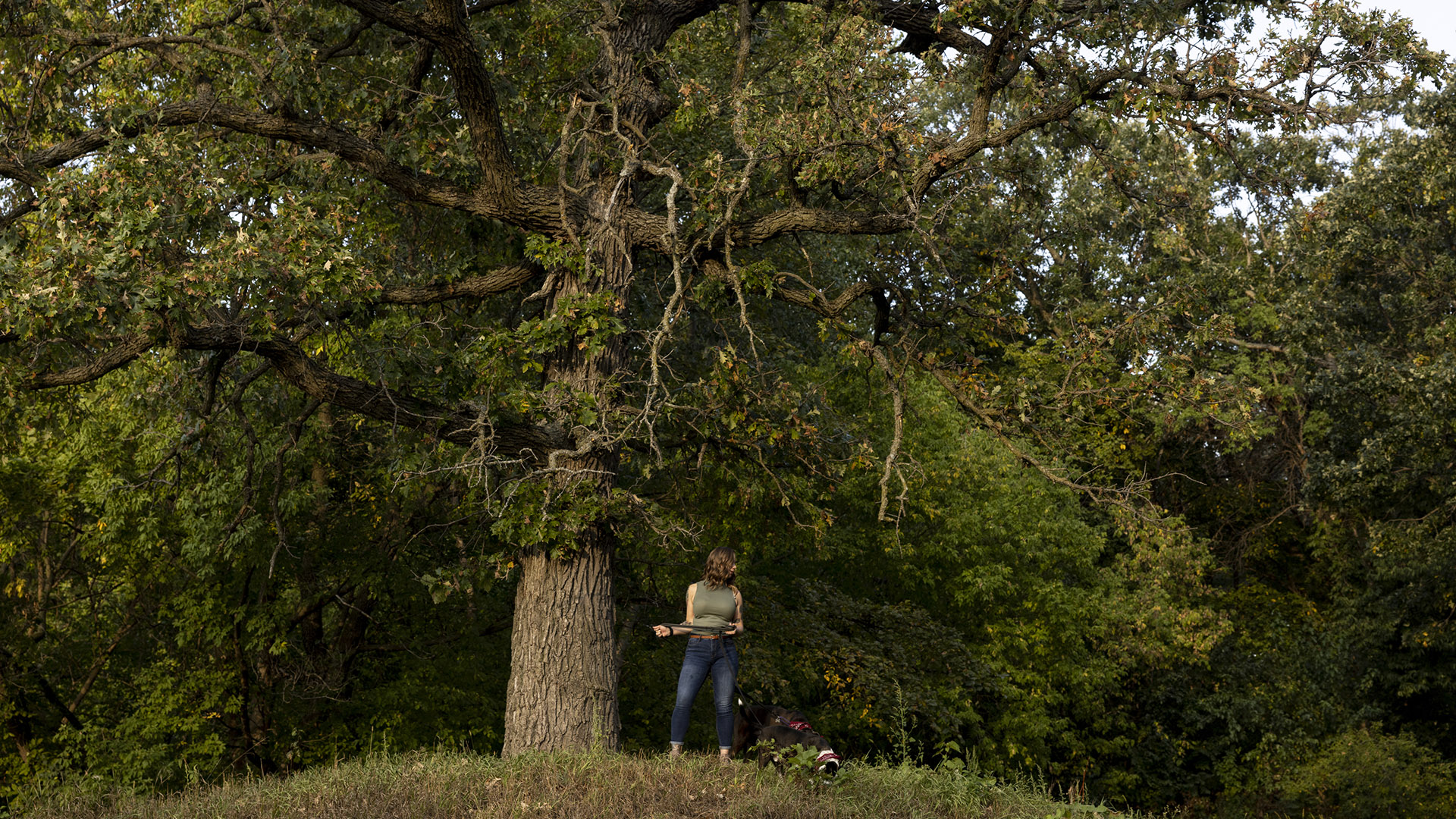A Grand Chute police recruit alleged she was sexually assaulted by two other cadets — days later she lost her job
The Grand Chute Police Department didn't seek outside investigation for a case involving its own employee, yet invoked Marsy's Law, a provision in the Wisconsin Constitution, to resist disclosing details of the incident.
Wisconsin Watch
November 27, 2023 • Northeast Region

A former Wisconsin police recruit, photographed near her home outside of Wisconsin, was forced to resign from the Grand Chute Police Department days after reporting sexual assault by two police academy classmates. Her former employer maintains her separation from the agency was unrelated to the alleged crime. (Credit: Jenn Ackerman for Wisconsin Watch)

This article was first published by Wisconsin Watch. It includes details of an alleged sexual assault.
A 21-year-old police recruit stood in the early morning winter darkness, unsure of what had just happened inside the Comfort Suites in Grand Chute.
After a night of heavy drinking she awoke partially clothed in a hotel bathtub. Two male academy recruits — from Appleton and Sheboygan — were dousing her feet with cold water and slapping her awake. She dressed and fled the hotel room, but still felt too drunk to drive, so she phoned a trusted co-worker at the Grand Chute Police Department.
After the officer brought her to the police station, she described her ordeal and raised the possibility that she had been sexually assaulted. A DNA swab and blood test were taken at the hospital. She later told Wisconsin Watch she felt confused and still intoxicated during the initial interview.
“Some of the things that I told them — when I was reading the report — I didn’t even remember telling them,” she said.
The two men involved initially gave conflicting accounts of what happened. DNA results that came back almost two months later confirmed one of the men in the hotel room had sex with her. Yet within 34 hours of the reported assault, the Grand Chute Police Department decided not to refer criminal charges to the district attorney and within a week forced her to resign over an unrelated disciplinary complaint.
Wisconsin Watch obtained internal reports, reviewed the evidence and spoke to criminal justice experts. It found in a case like this, in which a police department employee is an alleged crime victim, Wisconsin has no clear standard for when an outside agency must be involved to avoid a potential conflict of interest either in the law or through professional guidelines.
Wisconsin has adopted a constitutional amendment, known as Marsy’s Law, guaranteeing a crime victim’s right to fairness in the justice system. Grand Chute police cited the law in refusing to release the report or details of the incident to Wisconsin Watch, the latest example of a Wisconsin police department using Marsy’s Law to shield individual police officers from scrutiny.
The Wisconsin Watch investigation also found efforts by top Sheboygan police officials to shepherd one of the men involved through the civilian oversight process without disclosing potential red flags from his past. Wisconsin Watch previously reported on a culture of sexual harassment within the Sheboygan Police Department that had not been disclosed to the public.
Wisconsin Watch learned about the Grand Chute sexual assault allegations as part of its initial investigation into the Sheboygan police department and then identified, located and made initial contact with the woman involved. Wisconsin Watch is not naming the parties because it does not typically name alleged sexual assault victims and because the two men involved have not been charged with a crime.
The woman involved said she felt the department used the separate disciplinary review as a pretext to force her out after she reported the assault. Official records show only that she abruptly resigned from the police department before graduating from the law enforcement academy.
“I feel so betrayed by law enforcement as a whole,” she said.
She said because her allegations involved officers from two partner agencies and she was subject to an internal review, her employer should have called in an outside agency like it does for a police shooting.
“I don’t think Grand Chute should have investigated it,” she said. “I think they should have called in other people.”
A parallel administrative investigation by Fox Valley Technical College, where the three were enrolled, found the woman’s account — that she was too intoxicated to consent to sex — was credible. The investigation led to both men being suspended from the law enforcement academy. Shortly after the incident they were both out of a job within their respective departments.
The two men did not respond to calls, voicemails, text messages and emails for comment.
‘There’s no reason I can’t do this’
The female recruit grew up in a small suburban Appleton community. She didn’t have any family in law enforcement and never imagined she would work as a police officer.
“As a child, I always kind of admired the profession,” she said.
She wanted to help people in need and began training to be an EMT. But she found it unfulfilling and was drawn to working closer to her own community. She enrolled in criminal justice courses and said the subject fascinated her.
“There’s no reason I can’t do this,” she recalled thinking, “just because I don’t have a family legacy.”
Shortly after her 20th birthday, Grand Chute’s police department hired her as a community service officer — a part-time civilian employee who investigates minor complaints such as off-leash dogs and parking violations. The entry level program is often a precursor to the 18-week police academy.
A year and a half into her employment, she learned someone filed a complaint alleging she disparaged the department in front of academy students and used a slur to refer to a co-worker with whom she had clashed, which she disputes.
The complaint also alleged she occasionally talked with a co-worker while leaving a phone call on hold and neglected to conduct neighborhood patrol checks, which she acknowledged.
The review was opened in early January 2022. She said at first she was assured it would take a week or two, but it dragged on without resolution. She said she threatened to quit in February but was told she would get no reference from the department if she did.
“The inquiry was going on for so long,” she said. “I was like, I just want this to be done with.”

A portrait of a former police recruit taken near her home outside of Wisconsin on Sept. 17, 2023. The woman says she doesn’t think the Grand Chute Police Department should have investigated her sexual assault allegations against two law enforcement academy classmates. (Credit: Jenn Ackerman for Wisconsin Watch)
A night out after success on the shooting range
Fox Valley Technical College’s law enforcement academy recruits were out on March 2, 2022 — a Wednesday evening — to celebrate passing their firearms qualification. The woman met a friend at a steakhouse for dinner and a cocktail after class, and she later spotted the two academy classmates.
The trio next went to the lobby bar of the Comfort Suites where one of the men was staying, before heading to The Peppermint Hippo strip club in Neenah for more drinks.
“On the car ride back to the hotel I couldn’t even hold my own head up,” she recalled.
By the time they returned to the Comfort Suites, she told investigators, she had between six and nine mixed drinks and as many as three shots over the course of the evening.
“One of the things that registered as a red flag to me — after the fact — was that the only drink I paid for myself that night was the margarita I had before I even met up with them,” she said. “Every other drink was being brought to me by them. And I just kept drinking, for free.”
She was too drunk to drive back to her mother’s house nearby so one of the men rented a second room. What happened next inside the room is in dispute.
The woman said she lay down on the couch. She vaguely remembers being carried to the bed and her jeans being pulled down but didn’t resist because her pants were tight and uncomfortable.
“I felt like I was way too drunk. I just wanted to go to bed,” she said. “Because I think at that point … I was like, ‘I’ve been drunk for too long. I just want to be sober again.'”
In the report one of the men said he picked her up and tossed her onto the bed as she was laughing. She told investigators she may have been carried to the bed, but her recollection was hazy.
She later recalled both men performing sexual acts on her while she slipped in and out of consciousness, unable to physically resist.
“I couldn’t get myself to come to,” she said, “to wake myself up and stop anything.”
Speaking to Grand Chute police investigators, one of the men at first denied any sexual contact, claiming that she had attempted to have sex with him and that he could be considered a victim of sexual assault. After police revealed the other man confirmed the three had sex, he changed his story.
All three told investigators that they fell asleep but woke up minutes later when the woman’s alarm went off around 2 a.m.
“They carried me into the shower and set me on the side of the tub and turned the cold water on me to try and wake me up,” she recalled. “Because I think at that point, they just kind of wanted to get rid of me.”
Investigators met a second time with her that afternoon. They suggested she answer a Snapchat social media message she received from one of the men earlier that morning. The detective coached her on how to answer, she said.
The detective’s coaching is not reflected in the report that includes a transcript of the written exchange. She responded at one point that she was “embarrassed” — a word choice she said was suggested by the detective and which she later thought hurt her credibility.
“Embarrassed isn’t the right word to describe how I feel about this,” she told Wisconsin Watch. “If I had regrets, this would not be the course of action I would take.”
Open and shut in less than 34 hours
Investigators concluded the woman wasn’t completely incapacitated by alcohol because she wasn’t visibly swaying when she checked into the hotel and she used her phone to call an officer she knew.
Grand Chute Police Chief Greg Peterson said investigators ultimately received conflicting stories about what happened inside the room.
“There was her statement and there are the statements from (the two male recruits) — their opinion that she wasn’t completely blacked out,” he said.
Experts say sexual assaults can be difficult to prosecute for a number of reasons but particularly when the parties know each other, there is no sign of physical coercion and alcohol is involved.
A lot of times it comes down to whose account investigators choose to believe, said Cassia Spohn, an Arizona State University criminal justice professor and nationally recognized expert in sexual assault investigations. “It’s a really difficult case to determine with any degree of precision what actually happened.”
But Spohn — who advises the military and metropolitan police agencies on handling sexual assault cases — also called the quick resolution of the case “troubling.”
“In my experience of reviewing these kinds of cases, the police would not close the case so quickly,” she said. “They would spend a little more time giving the victim at least the satisfaction of knowing that they did do a thorough investigation.”
Spohn based her opinion on the incident report prepared by Grand Chute police investigators, whom she credited with apparently thorough work — gathering evidence immediately at the hotel and interviewing all three involved.
Spohn said the fact that all three confirmed that the woman was out cold with her socks on in the bathtub and they were slapping her to try to wake her up supported her claim that she was too intoxicated to consent.
Spohn also said it was odd that a detective would suggest the victim say she felt “embarrassed” after being sexually assaulted if they wanted to get information out of a potential crime suspect.
“You think that they would have coached her to say ‘I feel really violated’ rather than ’embarrassed’ and his response might have been different,” Spohn said.
In an interview Grand Chute Capt. Colette Jaeger said investigators believed the woman was telling the truth, but the evidence they found — which included video surveillance footage from the hotel lobby — wasn’t consistent with someone being incapacitated to the point of being sexually assaulted.
“She reported sexual assault, and then the elements of the crime just weren’t able to be confirmed, validated,” Jaeger said. “I mean, what we were left with was her saying she did not give consent and then two other stories as well as video evidence that didn’t support that.”
Much of the woman’s account to investigators took place in the early morning when she said she was still reeling from more than 10 alcoholic drinks the night before.
“By her own statement, (she) could not recall if she had said yes to the encounter occurring and she did not recall what had occurred,” detective Sgt. Joe Teigen wrote in his summary explaining why criminal charges were not filed.
Ian Henderson, an attorney and policy director for the Wisconsin Coalition Against Sexual Assault, said when police officers are involved in a critical incident like a shooting it’s standard practice to give them time to cool down and collect their thoughts before taking a definitive statement.
That the female recruit was confused and expressed doubt over what had just happened immediately after a traumatic event should not be a surprise. “Doing a comprehensive, investigative interview, a day or two after the assault” is considered “best practice,” Henderson said.
But investigators notified all three within 34 hours that criminal charges weren’t being filed. Peterson said his department didn’t rush anything.
“The length of time is not a good indicator of the quality of the investigation,” Peterson said. “I think it was very thoroughly investigated. So, I do feel sorry for the experience that (she) went through. But I do think she was treated with respect.”
Grand Chute police officials confirmed they have no plans to reactivate the investigation. The toxicology report found no evidence of foul play such as a date rape drug in her system.

A portrait of a former police recruit taken near her home outside of Wisconsin on Sept. 17, 2023. Her former agency recommended no charges after concluding a sexual assault investigation within 34 hours, which one criminal justice expert calls “troubling.” (Credit: Jenn Ackerman for Wisconsin Watch)
No professional standards for potential conflicts
Wisconsin state law requires police agencies to call in third-party investigators in critical incidents when officers kill or seriously wound someone in the line of duty.
But the law only applies to those narrow circumstances. And professional standards don’t provide concrete guidance over investigations when there are potential conflicts of interest, said Glendale Police Chief Mark Ferguson, president of the Wisconsin Law Enforcement Accreditation Group.
“We do not have a specific standard that covers an agency requesting another agency to conduct an investigation,” he said.
Grand Chute’s police chief disputed that there were any conflicts in investigating an alleged crime against the recruit while she was separately under administrative scrutiny.
“There usually isn’t a conflict associated with investigating somebody who has been a victim of a crime,” Peterson said.
Daniel Shaw, regional program manager for the Commission on Accreditation for Law Enforcement Agencies (CALEA), of which Grand Chute is not a member, said agencies may conduct personnel investigations with regard to administrative violations of policy and procedure. But the group recommends that agencies not investigate their own employees alleged to have committed crimes.
If an officer under a personnel investigation is an alleged crime victim, Shaw said he would want an outside agency to review the case.
“I guess if that happened in my jurisdiction, I’d want to give it to some other agency,” said Shaw, who was a police chief in a mid-sized Michigan city for a decade. “That’s my personal view — not a CALEA view.”
Marsy’s Law and victim rights invoked to withhold records
When Wisconsin Watch initially requested Grand Chute’s report on the alleged sexual assault during an investigation into sexual harassment within the Sheboygan Police Department, Grand Chute police declined to release even a redacted version of the report, claiming even associations could violate the privacy of victims.
“It is critical for us to consider the potential adverse effects that may occur if such sensitive records were to be released,” Jaeger, the Grand Chute police captain, wrote in denying Wisconsin Watch’s request.
The department refused to release any narrative — even without names.
“It is more complicated than simply redacting a name in an investigation of this nature,” Jaeger wrote.
Outagamie County District Attorney Melinda Tempelis — whose office has a role enforcing the public records law — agreed with the police department and declined to intervene.
Resignation not voluntary
Five days after the incident the woman was told her employment was over due to the findings of the administrative inquiry. She had a choice: be terminated or immediately resign.
Writing two days after she resigned, Peterson noted in an administrative review that her alleged disparagement of the department to fellow students could damage the agency’s reputation and make it harder to recruit.
Peterson denies any correlation between her departure and her allegation of a crime.
“The episode at the hotel had already taken place — it didn’t change or alter my assessment of the administrative violations,” Peterson told Wisconsin Watch. The administrative violations warranted “substantial discipline up to and including termination. It became moot, you know, she had chosen to resign.”
Town of Grand Chute Human Resources Director Sue Brinkman was among those present when the woman was called in on the last day of her job. She confirmed her resignation was not voluntary.
Male recruits lose their jobs
The two men also lost their jobs with their respective police departments.
Appleton police declined to answer questions, but it did release a summary of its disciplinary review to Wisconsin Watch following a public records request. Grand Chute’s police chief contacted his Appleton counterpart the evening of March 3, 2022, to notify him that Appleton’s recruit was the subject of a sexual assault complaint.
Appleton Police Chief Todd Thomas wrote that the recruit was terminated for “immoral” and “unbecoming” conduct three days later. That was after receiving a copy of Grand Chute’s incident report that concluded there was no probable cause for his arrest.
The recruit, who had previously resigned after about a year and a half as a prison guard at Oshkosh Correctional, returned to his job as a corrections officer at the medium-security prison.
The Sheboygan recruit resigned from his job on March 15, 2022.
“I am grateful for the support and belief you all had in me,” he wrote. “It brings me sadness and disappointment to have to submit this letter, but I am honored to have had the time spent with this department.”

A portrait of a former police recruit taken near her home outside of Wisconsin on Sept. 17, 2023. The two men she accused of sexual assault are no longer in law enforcement, but could be eligible to reapply to a law enforcement academy as early as 2024. (Credit: Jenn Ackerman for Wisconsin Watch)
College mum on sexual misconduct complaints
Fox Valley Technical College officials wouldn’t say how many sexual misconduct investigations they have conducted at the law enforcement academy in the past five years.
College investigators reviewed Grand Chute’s reports and conducted interviews with three additional witnesses who were at the bars with all three that evening, according to a May 27, 2022, letter outlining the college’s investigation.
College administrators found the woman’s account credible and moved to sanction the two male students.
“After reviewing the evidence and credibility of the witness statements, the preponderance of the evidence outlined above leads me to the finding that the complainant was unable to give valid consent to sexual intercourse due to her incapacitation,” wrote college Associate Vice President Elizabeth Burns.
College administration and law enforcement academy officials declined to answer questions.
“We respect the rights of our students and alumni to share their own experiences,” the college said in an unsigned statement.
The female recruit returned to the academy the following week and went on to graduate in May. She said she was warned not to discuss the incident and deliberately skipped the graduation ceremony.
“Going back to the academy as a whole was probably like, one of the hardest things I’ve done,” she said. “I was very isolated from my classmates.”
The Outagamie district attorney concurred with the decision not to bring charges against the men.
“Although I don’t remember the specific facts, there was a consensus between the investigator and me that this was not a case that could be proven beyond a reasonable doubt,” Outagamie County Assistant District Attorney Randall Schneider — a former high-ranking state Department of Justice official — wrote in an email to Wisconsin Watch.
“If additional information has come to light, this decision can be reevaluated,” he added.
Neither of the men is employed by a police department. The Department of Justice lists the Appleton recruit as “terminated for cause” and the Sheboygan recruit as resigned “prior to completion of internal investigation.”
They could apply to have their suspension from the college lifted in 2024.
Wisconsin Watch reporter Phoebe Petrovic contributed to this report.
The nonprofit Wisconsin Watch collaborates with WPR, PBS Wisconsin, other news media and the University of Wisconsin-Madison School of Journalism and Mass Communication. All works created, published, posted or disseminated by Wisconsin Watch do not necessarily reflect the views or opinions of UW-Madison or any of its affiliates.
 Passport
Passport











Follow Us